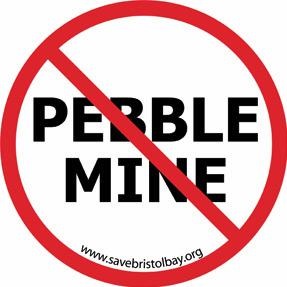
For Immediate Release
Monday, July 23, 2012
For more information:
Shoren Brown, Bristol Bay campaign director, sbrown@tu.org, 202-674-2380
Tim Bristol, Trout Unlimited Alaska Program director, tbristol@tu.org, 907-321-3291
Public comments urging protection of Bristol Bay, Alaska flood EPA as comment period closes; tally at 185,000 and counting
Juneau –Nearly ALL off the public comments submitted by the public on an Environmental Protection Agency analysis of a giant open pit mine proposed for a salmon-rich region of Alaska asked the agency to deny permits necessary for the mine to move forward.
Preliminary analysis of the public comment docket and conservation groups’ submissions as of Monday morning shows approximately 98 percent of the public comments are opposed to the Pebble Mine, a proposed gold and copper mine that would be located at the headwaters of two of Alaska’s as well as the world’s most productive salmon sockeye salmon rivers.
An estimated 185,000 comments have been received by the EPA, which closes the comment period tonight at 11:59 p.m.
About 180,000 support EPA action to protect Bristol Bay from mega hard rock mining
Less than 5,000 reject EPA involvement or ask for a longer timeline
In addition to written comments, more than 2,300 people attended eight hearings held by the EPA on the assessment. Public testimony overwhelmingly favored protection of Bristol Bay by more than 90 percent in the region, and more than 80 percent overall.
The mine will also be the focus of Public Television investigative show Frontline Tuesday, July 24. The hour-long show, “Alaska Gold,” will delve into the controversy surrounding Pebble Mine tomorrow on PBS stations nationwide.
The foreign-owned gold and copper mine would generate up to 10 billion tons of waste and would be stored in perpetuity at the headwaters of Alaska’s Bristol Bay watershed, home to the largest runs of sockeye salmon in the world and an economic engine for the fishing and tourism industries. Whether Pebble and related large-scale industrial development are allowed to proceed will depend on whether the Obama Administration decides whether to prevent Pebble and similarly massive projects under the Clean Water Act.
The proposal has attracted an outpouring of criticism from a diverse cross-section of the public including:
More than 700 businesses; more than 600 hunting and angling groups; the National Council of Churches and hundreds of congregations across the country; more than 200 chefs and restaurant owners; and leading jewelers including Tiffany & Co.
Industry associations including Food Marketing Institute, and 77 commercial fishing groups from Alaska to New Hampshire
Editorial boards of leading newspapers, including The New York Times
Over 80% of the local residents of Bristol Bay
The nation’s leading conservation groups
Former Alaska Governor Jay Hammond, the late Sen. Ted Stevens and North Carolina Republican Party Chairman Robin Hayes
“People have spoken loudly and clearly for their jobs, their businesses and their way of life. They want this Administration to stand up and protect Bristol Bay and its 14,000 jobs before it’s too late,” said Tim Bristol, director of Trout Unlimited’s Alaska Program.
Next, a peer review panel of experts will review and shape the draft Aug. 7 and 8 at a public forum in Anchorage. Then Obama Administration will decide whether to use Clean Water Act Section 404 (c) authority to prevent the negative impacts of Pebble Mine or other inappropriate development in the productive, clean watershed. Use of Section 404(c) would establish clear guidelines for the region, while allowing responsible development to progress.
“Commercial fishermen have invested deeply in the Bristol Bay fishery and they are asking the EPA to recognize the value of their livelihoods and the catch they haul in by ensuring that these American jobs and food supply aren’t lost to inappropriate mining,” said Bob Waldrop, executive director of the Bristol Bay Regional Seafood Development Association.
The EPA ‘s 338-page draft Bristol Bay Watershed Assessment documents Bristol Bay’s productive sockeye fishery as the largest runs on Earth, with up to 40 million fish returning annually to spawn. It finds that even without a major catastrophe or a series of cumulative spills or leaks, mining the Pebble deposit would destroy up to 87 miles of salmon streams and up to 4,200 acres of wetlands.
“The National Council of Churches is grateful for the EPA’s science assessment which reveals the interdependence of God’s creation and God’s people and highlights the potential impact of large scale development in Bristol Bay,” said Cassandra Carmichael, Director of the Washington Office, National Council of Churches, which also submitted comments to the EPA.